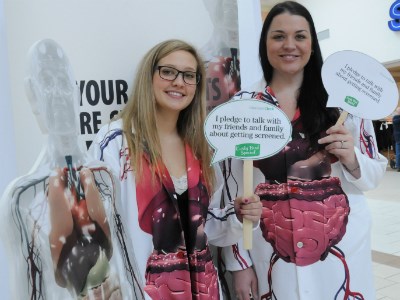Susan Keskinen has lost a lot to cancer.
She was diagnosed with endometrial cancer in 2005, and underwent a hysterectomy.
Then, in 2010, she was diagnosed with a second cancer — colorectal. On top of chemotherapy, she had surgery to remove part of her bowels. She now lives with a colostomy bag.
Several months after she was diagnosed with colorectal cancer, her husband was diagnosed with terminal lung cancer. He died March 30, 2012.
“I'm still coping with grieving the loss of my husband,” Keskinen said. “It is getting somewhat better. There were days that I would just cry all day.”
The 59-year-old said she wants her story to act as an inspiration to others to have a conversation with their primary health-care providers about colorectal cancer screening.
After she had her first bout of cancer, Keskinen went in for a checkup with her cancer doctor every six months. This doctor discovered the colorectal cancer through a manual exam.
Keskinen said the issue probably wouldn't have been discovered otherwise, because like many other Sudburians, she didn't have a family doctor at the time.
“I hadn't had any apparent symptoms, so it was quite a shock to realize I did have colorectal cancer,” she said.
Although Keskinen eventually recovered from her surgery and has adapted to using the colostomy bag, she said her life “is never going to be the same.”
Ontarians over the age of 50 are eligible to have their stool tested for minute amounts of blood which may indicate colorectal cancer. The Fecal Occult Blood Test is non-invasive, and can be done at home.
Those whose test comes back positive or those with a family history of colorectal cancer are sent for a colonoscopy, a procedure which can detect issues more definitively.
Keskinen said one of her friends recently admitted to her that she didn't like doing the Fecal Occult Blood Test because it was “so yucky.”

I hadn't had any apparent symptoms, so it was quite a shock to realize I did have colorectal cancer.
Susan Keskinen,
colorectal cancer survivor
“I pointed at my belly, and I said 'You know what, this is yucky, but at least I have my life,'” Keskinen said. “A simple test can save lives.”
Nicole Gauthier, cancer prevention and screening co-ordinator for the Northeast Cancer Centre, said colorectal cancer screening isn't a topic that people are comfortable talking about.
“We hear a lot about the 'ick' factor,” she said. “We're constantly trying to find new, creative, innovative, fun ways to get out an important message.”
This week, for example, a “photo booth” is touring the city, where people can have their picture taken with a cutout of the see-through character who starred in colorectal cancer screening commercials a few years ago.
“The whole thing is that cancer screening sees what you can't,” Gauthier said. “You can't see your insides. You can't see the inside of your colon. That's why screening is so important.”
The photo booth is part of awareness activities taking place during March, which is Colorectal Cancer Awareness Month.
It will be at the New Sudbury Shopping Centre until 9 p.m. March 7, at the Rainbow Centre from 9:30 a.m. to 2 p.m. March 8 and the Sudbury Wolves game at the Sudbury Arena starting at 7 p.m. March 8.
The idea is that by having your picture taken with the see-through man, you're making a pledge “to talk to your doctor or nurse practitioner about colorectal cancer screening,” she said.
Those who visit the photo booth will be able to take home a postcard with their picture on it, and will have the same picture emailed to them so they can share it on any social media sites they belong to.
The photos will also be collected in a photo gallery on Cancer Care Ontario's Facebook page.
Gauthier said Ontario has one of the highest colorectal cancer rates in the world.
It's estimated that in 2012, approximately 8,700 Ontarians were diagnosed with colorectal cancer, and 3,450 died from the disease, she said.
She encourages people to be screened, as if colorectal cancer is caught in the early stages, it's 90-per-cent curable.
“If it's found at a later stage, it's much more difficult to treat, and your chance of a cure is significantly decreased.”
For more information about colorectal cancer screening, visit ontario.ca/screenforlife.
